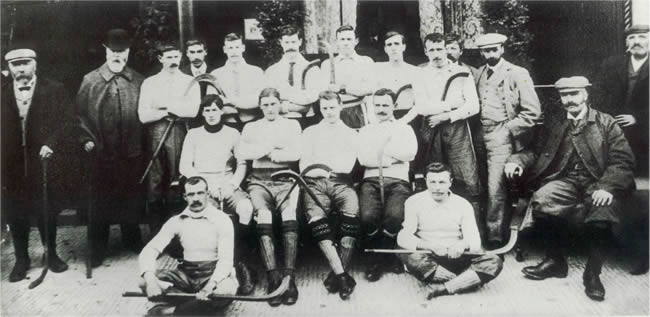together we are 'more
Club History
Shinty’s History goes back 2000 years to Ireland and comes from the same root as the Irish sport of hurling.
It is thought to have been brought to Scotland by Irish settlers. Legend has it that St Columba who arrived in Iona in AD563 was banished from Ireland because he fell out with his king about a game of Camanachd.
Shinty has been played in the newtonmore area for centuries, but more recently, there are records of shinty being played at the club’s present field Eilan Bheannchair – known as the Eilan – since 1877 and the club was formally constituted in 1890. In 1893 the club was a founding member of the Camanachd Association.

Our Record
Since then, the club has won the Camanachd Cup – The Scottish national shinty trophy, no less than 34 times. A record unmatched by any other team in the game. The club has also won the MacTavish Cup a record 43 times, together with a string of other honours.
Rivalries
Many clubs throughout Scotland have long and friendly rivalries with Newtonmore – notably Kyles Athletic have been involved in many well-contested tussles in the past and have something of a special friendship with Newtonmore, each having invited the other to take part in their Centenary celebrations.
The keenest rivalry, however (although sometimes perhaps less than friendly!), is with near neighbours Kingussie. For about twenty years from the late 1980s Kingussie dominated the sport whilst Newtonmore rebuilding from a period of dominance in the 1970s and early eighties kept stalling. However winning the Premier Division title in 2010, retaining it in 2011, 2012, 2013, 2014, 2015 and 2016, and beating Kingussie in the Camanachd Cup Final in 2011, announced clearly to the rest of the sport that Newtonmore was back at the top of the game.
Interesting Facts
A 15th Century memorial stone on the island of Iona depicts not only the owners broadsword, but also a caman with a ball beside it.
100 years ago there was a huge debate about whether the kilt or knickerbockers should be compulsory when playing. The kilt supporters lost the argument.
In olden days the principle shinty game would be played at New Year between villages. There was no limit to the number of players and the game could last from dawn till dusk.
Shinty is now a summer sport.